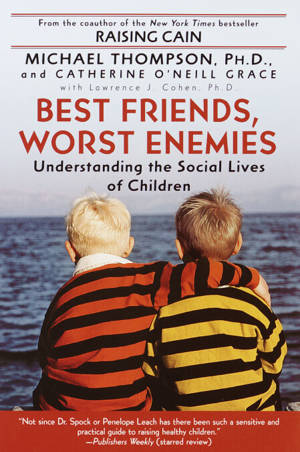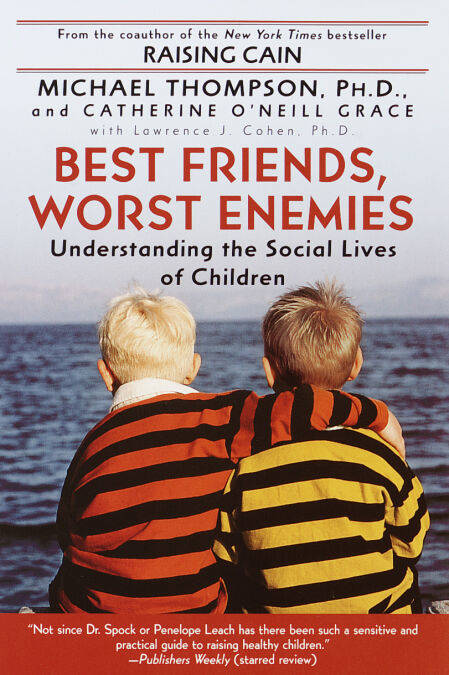
- Afhalen na 1 uur in een winkel met voorraad
- Gratis thuislevering in België vanaf € 30
- Ruim aanbod met 7 miljoen producten
- Afhalen na 1 uur in een winkel met voorraad
- Gratis thuislevering in België vanaf € 30
- Ruim aanbod met 7 miljoen producten
Zoeken
Best Friends, Worst Enemies E-BOOK
Understanding the Social Lives of Children
Michael Thompson, PhD, Cathe O'Neill-Grace
E-book | Engels
€ 8,37
+ 8 punten
Omschrijving
Friends broaden our children’s horizons, share their joys and secrets, and accompany them on their journeys into ever wider worlds. But friends can also gossip and betray, tease and exclude. Children can cause untold suffering, not only for their peers but for parents as well. In this wise and insightful book, psychologist Michael Thompson, Ph.D., and children’s book author Catherine O’Neill Grace, illuminate the crucial and often hidden role that friendship plays in the lives of children from birth through adolescence.
Drawing on fascinating new research as well as their own extensive experience in schools, Thompson and Grace demonstrate that children’s friendships begin early–in infancy–and run exceptionally deep in intensity and loyalty. As children grow, their friendships become more complex and layered but also more emotionally fraught, marked by both extraordinary intimacy and bewildering cruelty. As parents, we watch, and often live through vicariously, the tumult that our children experience as they encounter the “cool” crowd, shifting alliances, bullies, and disloyal best friends.
Best Friends, Worst Enemies brings to life the drama of childhood relationships, guiding parents to a deeper understanding of the motives and meanings of social behavior. Here you will find penetrating discussions of the difference between friendship and popularity, how boys and girls deal in unique ways with intimacy and commitment, whether all kids need a best friend, why cliques form and what you can do about them.
Filled with anecdotes that ring amazingly true to life, Best Friends, Worst Enemies probes the magic and the heartbreak that all children experience with their friends. Parents, teachers, counselors–indeed anyone who cares about children–will find this an eye-opening and wonderfully affirming book.
Drawing on fascinating new research as well as their own extensive experience in schools, Thompson and Grace demonstrate that children’s friendships begin early–in infancy–and run exceptionally deep in intensity and loyalty. As children grow, their friendships become more complex and layered but also more emotionally fraught, marked by both extraordinary intimacy and bewildering cruelty. As parents, we watch, and often live through vicariously, the tumult that our children experience as they encounter the “cool” crowd, shifting alliances, bullies, and disloyal best friends.
Best Friends, Worst Enemies brings to life the drama of childhood relationships, guiding parents to a deeper understanding of the motives and meanings of social behavior. Here you will find penetrating discussions of the difference between friendship and popularity, how boys and girls deal in unique ways with intimacy and commitment, whether all kids need a best friend, why cliques form and what you can do about them.
Filled with anecdotes that ring amazingly true to life, Best Friends, Worst Enemies probes the magic and the heartbreak that all children experience with their friends. Parents, teachers, counselors–indeed anyone who cares about children–will find this an eye-opening and wonderfully affirming book.
Specificaties
Betrokkenen
- Auteur(s):
- Uitgeverij:
Inhoud
- Aantal bladzijden:
- 320
- Taal:
- Engels
Eigenschappen
- Productcode (EAN):
- 9780345449450
- Verschijningsdatum:
- 23/10/2001
- Uitvoering:
- E-book
- Beveiligd met:
- Adobe DRM
- Formaat:
- ePub

Alleen bij Standaard Boekhandel
+ 8 punten op je klantenkaart van Standaard Boekhandel
Beoordelingen
We publiceren alleen reviews die voldoen aan de voorwaarden voor reviews. Bekijk onze voorwaarden voor reviews.








